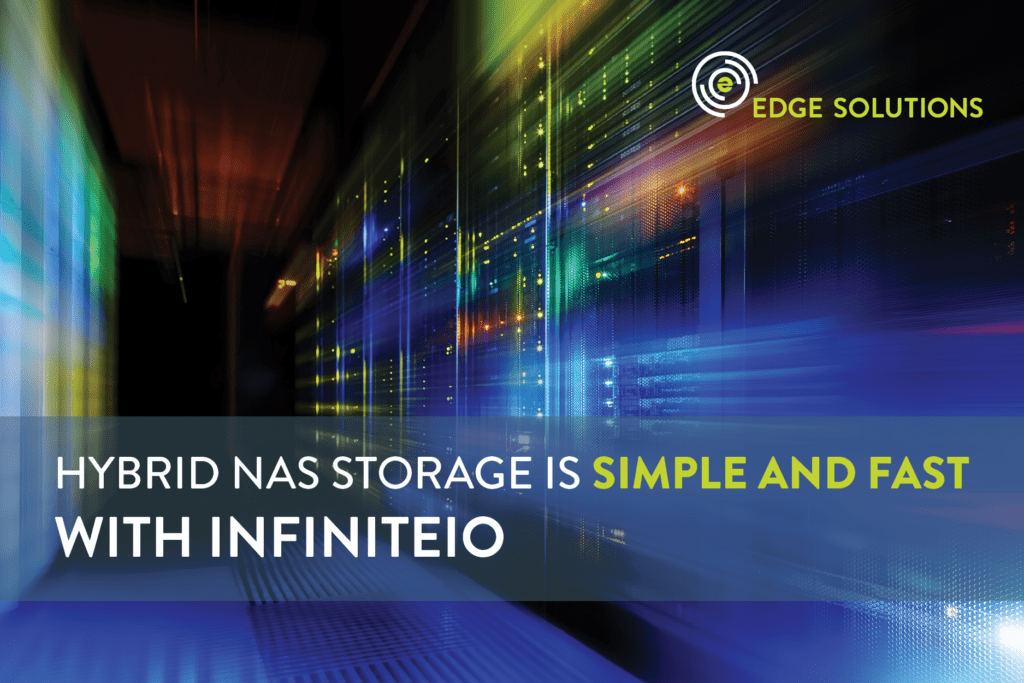Easily identify and intelligently migrate petabytes of inactive data to the cloud—and save millions of dollars in storage costs.
Traditional approaches to data management in a hybrid NAS storage environment involve a combination of tools from disparate suppliers, which doesn’t improve performance and often makes the problem more complex. InfiniteIO was developed to help enterprises easily and effectively address the challenges of hybrid NAS storage.
Studies show that 70% to 90% of storage requests coming from the network are for file metadata: file name, size, creation date, the date the file was updated, the list of files in a particular folder or directory, and who has access to the file. InfiniteIO responds to these requests directly, dramatically accelerating response time, making the NAS system more efficient, and improving overall performance.
So, how does it work?
InfiniteIO uses deep packet inspection (DPI), commonly used in network management and security, to quickly and easily optimize access to storage and minimize storage costs. Network security applications commonly use DPI to inspect IP packets as they flow by on the network to detect intruders and quarantine their network flow. DPI allows InfiniteIO to analyze data in real time as it travels over the network.
This appliance-based solution is installed in front of enterprise NAS solutions to learn about the storage in use, including hot files and their associated metadata—without disruption to current operations. After a one-time scan to generate a complete picture of the storage system, it begins to respond to metadata requests on behalf of the back-end storage devices using its own internal DRAM. This offloads the serving of metadata requests from the back-end filers, which can be up to 90% of storage requests—in only tens of microseconds of latency.
Metadata from active files is held in memory, analyzed, and used to accelerate and consolidate storage, as well as providing real-time analytics and transparent file tiering.
But wait, there’s more!
InfiniteIO learns what files an enterprise is and is not actively using so that files can be transparently tiered to more cost-effective storage. All storage will still appear to be local, regardless of location, but hot (active) files are kept in prime Tier-1 storage and cold (inactive) files can be migrated. The process isn’t disruptive to workloads or applications and doesn’t require any change to the storage infrastructure. Enterprise users connect to storage using the system’s IP address.
Another helpful feature of InfiniteIO is easy policy creation, for example, migrating all files that haven’t been actively used in the last 180 days or migrate data based on file name, directory, or other data. Multiple polices can also be created based on the needs of individual users, groups, or teams. Policies can be scheduled or executed immediately (they run at midnight, by default).
If a read or write request is made for data that’s been migrated, InfiniteIO will place that data back in the original NAS system in its original location. The application has no idea that this process occurred; the requested data just shows up.
Backup applications make a surprising number of metadata requests, but because inactive data is migrated to the cloud, the backup of active files can be accomplished faster, reducing backup window length.
Let’s get to work.
The InfiniteIO dashboard provides real-time analysis of its functions, including a quick overview of system health, performance statistics, storage utilization, latency graphs, NFS calls per second, and estimated savings. It also reports, in aggregate, how much storage a migration will save.
Once it’s installed, InfiniteIO goes to work. There’s no software to install or maintain, no configuration changes or special mounts required. And, it can be acquired in a one-time purchase. Purchase the appliance once and manage as much data as necessary.
InfiniteIO is an elegant and simple solution and should be on the short list of any company looking to speed up their storage in hybrid NAS storage. If you’re interested in learning more about InfiniteIO and/or how Edge Solutions can help you with your hybrid NAS storage environment, contact us today.
